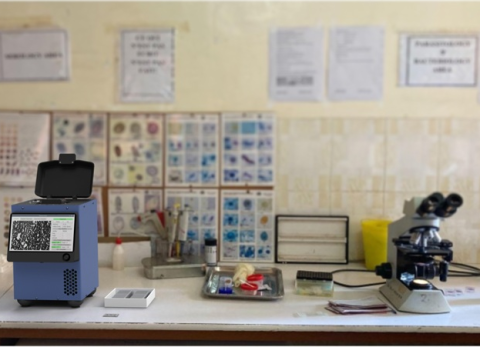New Special Collection: Artificial Intelligence (AI) in Global Health

The digital world is evolving at a rapid pace, and the intersection of healthcare and artificial intelligence is at the forefront of this changing landscape. During the RSTMH Annual Meeting 2025, we announced the publication of a cross-journal Special Collection ‘Artificial Intelligence (AI) in Global Health’, featuring papers from around the world exploring AI and healthcare. Tom Pinfield, RSTMH Managing Editor, highlights some of the key themes in the collection and explores the long-term adoption of AI.
The promise and complexity of AI
AI has transformed how health care services are delivered, from drug development to personalised medicine, to disease monitoring and surveillance.
AI has been shown to be a cost-effective method in improving the efficiency of the health care systems of many countries in the Global North, including the United States, United Kingdom, Canada, Italy, and Germany, and there is a growing interest in and wider commitment to leveraging the power of AI to address healthcare issues which are unique to lower- and middle-income countries (LMICs).
This special collection presents a timely exploration of how AI, machine learning, and digital technologies more generally are reshaping global health research, surveillance, and service delivery in LMICs.
From vaccine access in the Democratic Republic of the Congo to diabetic retinopathy screening in Tanzania, the collection showcases not only the promise but also the complexity of integrating AI-driven tools into health systems that are often resource-constrained.
Themes from the collection
A unifying theme is the use of AI to address service delivery gaps. Several papers highlight how advanced models can analyse unstructured or fragmented data at scale, revealing patterns that traditional tools miss. Whether interpreting open-text responses in household surveys or satellite imagery related to non-communicable disease risk factors, these technologies offer novel pathways to understanding and addressing health inequities.
In diagnostics, AI-powered innovations, such as the Remoscope for malaria detection and machine learning models for identifying Pneumocystis jirovecii pneumonia (PJP), reflect a shift toward non-invasive, low-cost, and scalable solutions. Similarly, efforts to standardise image datasets for parasitic disease detection or automate diabetic eye screening underscore AI’s role in task-shifting and extending care access.
The collection also highlights the importance of ethical, and contextual-related considerations. While the potential of AI is clear, several articles offer notes of caution in relation to bias, inequity, and digital exclusion. For LMICs to truly benefit, AI must be co-designed with local stakeholders, embedded in sustainable systems, and supported by investments in digital literacy, governance, and data infrastructure.
Lastly, mobile health (mHealth) interventions and interactive platforms, such as those improving neonatal care in Ethiopia, demonstrate how digital communication tools can influence health behaviours at the community level whilst at the policy level, AI-enhanced bio surveillance and evaluation of non-pharmaceutical interventions during COVID-19 show how data science can support real-time decision-making in public health emergencies.
Seeing global impact
We hope that by collating the latest original research, reviews and opinion pieces on the development, impact, and evaluation of AI in Global Health research and implementation, this work will help support the wider community with the long-term adoption of these technologies in LMICs.
Thanks to the authors who submitted their work to the Collection, and to the reviewers and Editors who assisted with the peer review of these articles. You can view the full collection in Transactions and International Health.
We have agreed terms with Oxford University Press to launch a new journal on the topic of Artificial Intelligence in global health, which we plan to launch in early 2026!